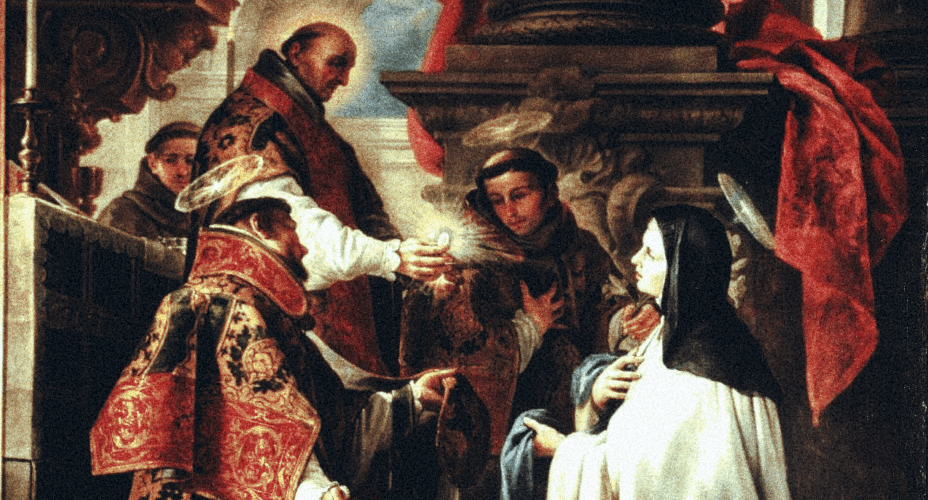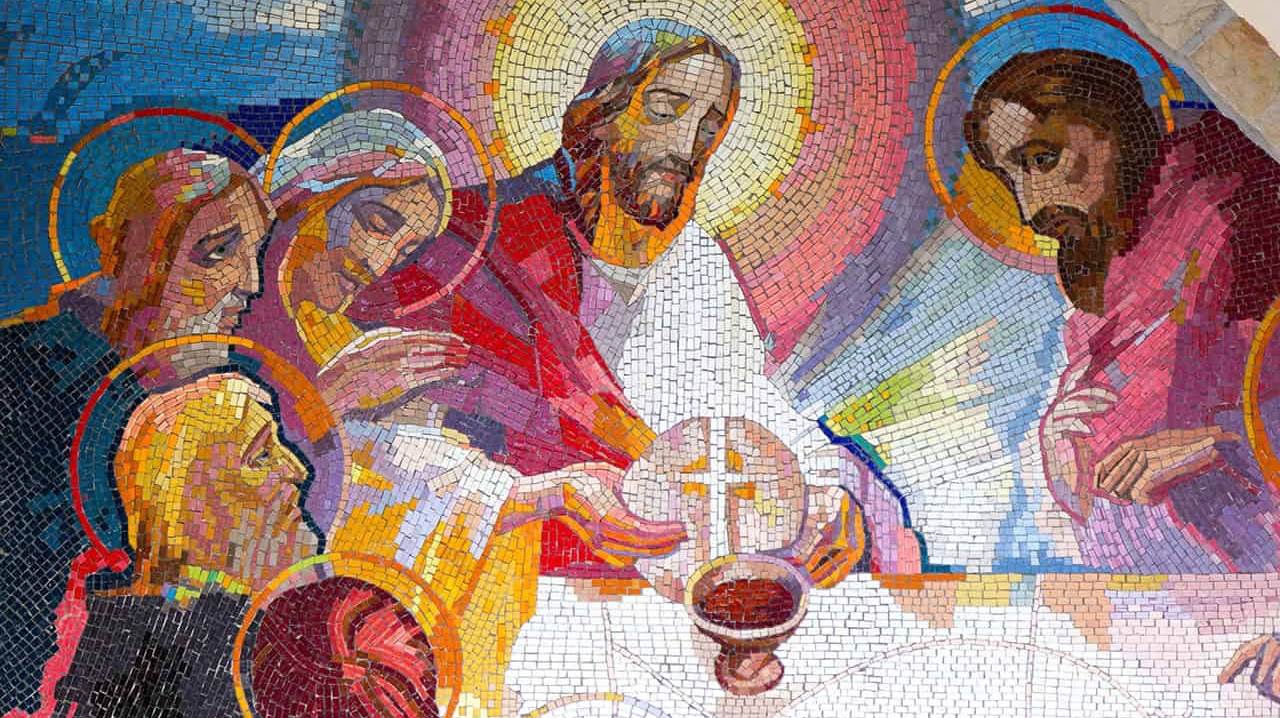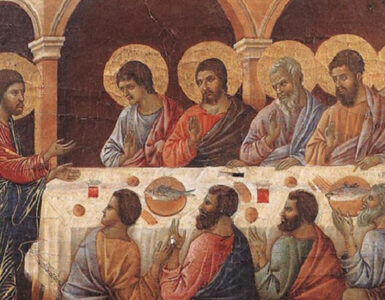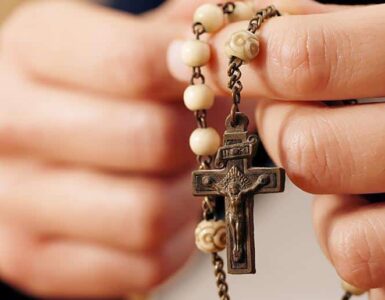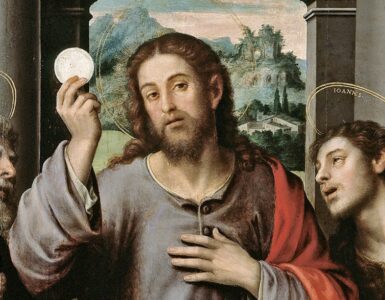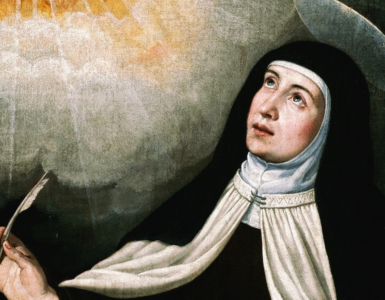In the famous 15th century English morality play Everyman, the character Five Wits reflects on the importance of the sacraments in our lives:
There is no emperor, king, duke, ne baron,
That of God hath commission
As hath the least priest in the world being;
For of the blessed sacraments pure and benign
He beareth the keys, and thereof hath the cure
For man’s redemption—it is ever sure—
Which God for our soul’s medicine
Gae us out of his heart with great pain.
If we wish to advance in our spiritual lives and draw closer to the Lord, we must take full advantage of the sacramental life offered to us through the Church. The sacraments are the essence of prayer itself. For example, Reconciliation allows us through prayer to cleanse our souls and be made whole. The Mass is the ultimate prayer in which we partake of the heavenly banquet in prayer.
The seven sacraments are not “extras,” or one of many options to find our way to God, but essential to growing in the spiritual life and being one with Him in prayer. During my time of formation as a deacon, my spiritual director, Father Leo Celano, a Norbertine Father of St. Michael’s Abbey and now of happy memory, stressed the critical nature of the sacraments. He said that if I was serious about my faith, and I truly desired to grow in holiness, the sacraments must play a key role in my spiritual life. He told me the truth that attending Mass daily had to become a priority.
Consider the words of Our Lord Himself in speaking about two of the sacraments, Baptism and the Holy Eucharist, and their essential place in our lives. One night we are told that the Pharisee Nicodemus visited Jesus and had a discussion about Baptism. Our Lord insisted, “Amen, amen, I say to you, no one can enter the kingdom of God without being born of water and Spirit.” (John 3:5)
Another time, while speaking to the crowds at Capernaum, Christ promised that He would give them the Holy Eucharist, and declared, “Amen, amen, I say to you, unless you eat the flesh of the Son of Man and drink his blood, you do not have life within you. Whoever eats my flesh and drinks my blood has eternal life, and I will raise him on the last day.” (John 6:53-54)
As Catholics, we need to understand the power, importance and critical nature of living a sacramental life. The Catechism of the Catholic Church teaches that the sacraments are “Efficacious signs of grace, instituted by Christ and entrusted to the Church, by which divine life is dispensed to us.” (1131, cf. 774). The visible rites by which the sacraments are celebrated are signs which signify and make present the graces proper to each sacrament. So, the sign of water I see in Baptism points to the invisible reality of the soul being washed clean of sin; the sign of bread in the Eucharist indicates that it is the spiritual food of my soul (although the Eucharist is not merely a sign, but is unique in that it is the only one of the sacraments that contains Christ personally).
There are seven sacraments: Baptism, Confirmation, Eucharist, Reconciliation, Anointing of the Sick, Holy Orders and Matrimony. Their purpose is to walk us through our lives, providing us with the essential graces we need along the way. We are physically born; Baptism cleanses our souls of Original Sin and introduces us to the life of grace and friendship with Christ. We mature and grow into adulthood; Confirmation matures us in the life of grace. We choose a vocation—for most of us marriage, for a few of us the priesthood—which correspond to Matrimony and Holy Orders. We need food and medicine; the Holy Eucharist is our spiritual food and Reconciliation heals the wounds of our souls caused by sin. And, we eventually pass on from this life, and the Sacrament of Anointing of the Sick prepares us to meet the Lord.
Though not everyone receives every sacrament, the Church affirms that, for believers as a whole, the sacraments are necessary as the mode of grace divinely instituted by Christ Himself. The Catholic Church is the sole dispenser of Christ’s sacraments and is considered to be the universal “sacrament of salvation.” The Catechism tells us the Church is centered on the Eucharistic sacrifice and the sacraments.
Three of the sacraments—Baptism, Confirmation and Holy Orders—can only be received once. Matrimony we will typically receive once, or perhaps a second or even a third time should our spouse(s) predecease us. Anointing, is usually infrequent but it depends on our circumstances. But the two “bread and butter” sacraments of the Church, ones we want to receive over and over again in our lives, are Reconciliation and the Eucharist. Let us focus our attention on these two essential sacraments.
RECONCILIATION
The Catholic Church teaches that Christ gave His Apostles and their successors the power to forgive sins after His Resurrection:
“‘Peace be with you. As the Father has sent me, so I send you.’ And when he had said this, he breathed on them and said to them, ‘Receive the holy Spirit. Whose sins you forgive are forgiven them, whose sins you retain are retained.’” (John 20:21-23)
The Sacrament of Reconciliation, also known as Penance and Confession, is an incredible act of love in which we enter stained and sinful and leave white as snow. Meditate on the love that God pours into us. We enter the confessional often full of shame and leave with peace and hope. Through the prayers of Reconciliation we offer our sorrow and receive the prayer from the priest that is music to the ears to all those who hear it: total absolution!
That great theologian and Doctor of the Church, St. Thomas Aquinas (1225-1274), wrote, “In the life of the body a man is sometimes sick, and unless he takes medicine, he will die. Even so in the spiritual life a man is sick on account of sin. For that reason he needs medicine so that he may be restored to health; and this grace is bestowed in the Sacrament of Penance.”
It is critical that each of us individually embrace humility, which stands in contrast to the first of the Capital Sins, pride. Pride was the sin of Lucifer, pride was the sin of the Pharisees; pride can be an obstacle keeping us from union with God.
Going to Confession, conversely, is an act of humility, especially when we go to a priest whom we know well. Reconciliation is humility in action! It is through humility that we embrace love and this sacrament of forgiveness. Through understanding humility we pray differently. We pray through surrendering all we have in our souls to Christ.
Confession is the sacrament that can mold us into an image of Christ. It is the mercy, sacrifice and forgiveness which transforms our character. If there is anything that separates us from Jesus, this sacrament will bring us together. We allow God to take away anything that is poison for our souls. In this way, we can pray with being one with Christ and with His grace and power. It sets the stage for miracles in our lives!
Before we go to Confession, we should pray and allow the Lord to reveal to us our sins so that we may be sorry for them. We should ask for grace to overcome habitual sin and temptations and increase personal virtue and our love of God.
Penance is absolutely necessary to help train us to forgive others and ourselves. It is through penance and discipline that we learn how to tame the unholy passions and desires that attack us. Through the process of Confession and Penance we strive for the fruit of the Holy Spirit rather than the pleasure of the flesh.
It takes a great deal of courage to break the bondage of sin. It is through humility that we can go to Confession and receive God’s forgiveness. What happens if we go to Confession and then find ourselves sinning soon afterward? It is more than okay to go back to Reconciliation if you need the help and grace. To be candid, it is critical that our soul be clean at all times, but especially when we minister to people. Since I give frequent talks and seminars, often every day, I take daily examination as to whether I need the grace of Reconciliation.
During one particular difficult period of my life, I felt separated from God. I was angry, judgmental, sinful in thoughts and actions. Not exactly a role model to lead people to Christ. I knew one thing, I needed grace and forgiveness and I knew I needed the Sacrament of Reconciliation to get out of the malaise I was in and receive the strength of Christ. I know people may be shocked, but I went to Reconciliation every day for four straight days! The malaise was broken and I felt incredible joy and strength and my seminars and my talks reflected it!
One of the most important spiritual disciplines for us to learn is examination of our conscience on a daily basis. Go before the Lord for your prayer time, perhaps in the evening. Ask the Lord to reveal to you when you have chosen sin instead of the Lord. When you have moved away from Him, called desolation, rather than toward Him, called consolation. This exercise is like a reflective mirror to examine our motivation with our actions. It is through this discipline that we can dig deep into our souls and attempt to ascertain what the stumbling blocks are that usually are connected to some type of forgiveness issue.
Knowledge of ourselves is a critical part of spiritual awareness and growth. While I am far from a saint, I can relate to so many of them who saw themselves as wicked and wretched. It is critical to truly pray and meditate and taste the love, mercy and forgiveness of God; it is hard not to see ourselves as horrible.
When we see our sin and weakness, we are on the way to greater holiness. If we see ourselves as people who don’t need mercy and forgiveness, we will only get deeper into sin and not forgive others of their weaknesses. Reconciliation begins with a desire for a clean heart, which will help us see God in ourselves and others. St. Augustine of Hippo (354-430), another Doctor of the Church, said, “The confession of evil works is the first beginning of good works. You do the truth and come to the light.”
MASS AND THE EUCHARIST
Once we have cleaned our souls in the Sacrament of Reconciliation, we should attend Mass and receive the Eucharist. We should go to Sunday Mass at a bare minimum; we should try to attend daily Mass as well.
Padre Pio was known for his devout and lengthy celebration of the Mass which drew large crowds. Go to YouTube and you can watch videos of how reverently and devoutly he celebrated the Sacred Mysteries. He said of the Mass, “It would be easier for the world to survive without the sun than to do so without the Holy Mass.”
We often come up with countless reasons why we don’t have time for daily Mass. It is a hassle, we need our sleep, our work schedule and on and on. The primary question I have for each of you reading this book is: “Who wants you to go to daily Mass and who doesn’t?” The Lord wants to give us “our daily bread,” to bless us abundantly with grace, strength and blessings. Who doesn’t want us to go to daily Mass? You know the answer. The enemy would do anything to convince us not to go to Mass and receive the Body and Blood of Jesus Christ.
Month after month, my spiritual director challenged my faith intention. I came up with excuses to justify my laziness. The reality is that receiving the Eucharist daily was not a priority. However, what often occurs happened to me. God brings us to our knees. Something happens in life, and frequent Mass attendance was no longer optional for me. I needed God. I needed grace. I needed supernatural strength and wisdom, and I needed it now!
Jesus is clear on the importance of the Bread of Life.
“I am the living bread that came down from heaven; whoever eats this bread will live forever; and the bread that I will give is my flesh for the life of the world.” (John 6:51)
Our life is connected to our willingness to be connected with the Eucharist and have it be an integral part of our lives. Jesus tells us over and over that He “thirsts.” (cf. John 19:28) He is hungry for souls and for us individually. Jesus wants us to forgive so that He can fill us with His love, forgiveness and grace. Jesus is constantly saying “come to me.” When we come to Him we want to forgive and be healed. We can no longer harbor bitterness and a spirit of holding onto our lack of forgiveness.
When we receive Holy Communion we need to do it with a heart that is free of hatred or anything that is against the love that is God. St. Paul warned,
“Therefore whoever eats the bread or drinks the cup of the Lord unworthily will have to answer for the body and blood of the Lord. A person should examine himself, and so eat the bread and drink the cup. For anyone who eats and drinks without discerning the body, eats and drinks judgment on himself. That is why many among you are ill and infirm, and a considerable number are dying.” (1 Corinthians 11:27-30)
Many of the early Christians were dying because of their unworthy reception of the Eucharist!
Paul also taught that the Eucharist brings unity and harmony among the brothers and sisters of Christ:
“The cup of blessing that we bless, is it not a participation in the blood of Christ? The bread that we break, is it not a participation in the body of Christ? Because the loaf of bread is one, we, though many, are one body, for we all partake of the one loaf.” (1 Corinthians 10:16-17)
We also read that, “They devoted themselves to the teaching of the apostles and to the communal life, to the breaking of the bread [the Mass and reception of the Eucharist] and to the prayers.” (Acts 2:42)
Jesus is the “Bread of Life.” It is this bread which truly transforms us into agents of His love, joy and peace. Jesus wanted to give Himself to us in a way that was necessary for our spiritual union and growth.
There are times in our lives when we feel broken, not wanted, unloved and lonely. In Isaiah, God tells us how important we are to Him, “Because you are precious in my eyes and honored, and I love you …” (Isaiah 43:4)
We are so important that He humbles Himself and allows Himself to be held in our hands as His Body and Blood.
The sacraments give us strength when we need it most, which is most of the time. We need to trust in Jesus and not be afraid to turn to Him.
“Do not fear: I am with you; do not be anxious: I am your God. I will strengthen you, I will help you, I will uphold you with my victorious right hand. … For I am the Lord, your God, who grasp your right hand; It is I who say to you, Do not fear, I will help you.” (Isaiah 41:10-13)
It is so critical to fully grasp how much Jesus wants us to be transformed into His image of love and forgiveness. That is why forgiveness is so emphasized as being paramount to being forgiven by God. Jesus calls us each by name and delivers us from the evil one.
“Do not fear, for I have redeemed you; I have called you by name: you are mine. When you pass through waters, I will be with you; through rivers, you shall not be swept away. When you walk through fire, you shall not be burned, nor will flames consume you.” (Isaiah 43:1-2)
There is no substitute for making Reconciliation and daily Mass an integral part of our lives. It is so vital that it is the same as making sure you have daily food, drink and sleep. Jesus loves you passionately and has forgiven you. Connect with Him through the sacraments and live a life of abundance!
The sacraments are essential for a life of prayer and holiness. The more connected we are to Jesus, the more we want Him in our hearts and souls each minute of each day. In order to grow we must surrender in humility through an act of will. This surrender must be done with a fervent prayer, a prayer from our heart in the deepest caravans of our soul. Do it and you will never regret it!


